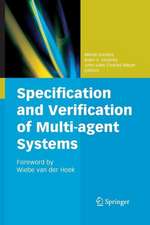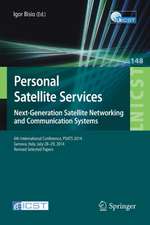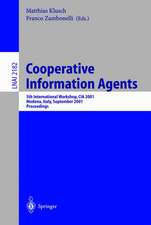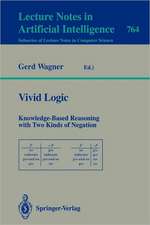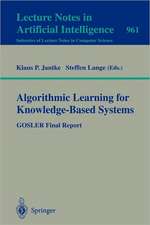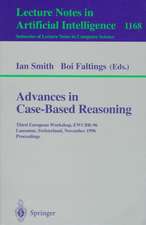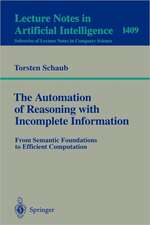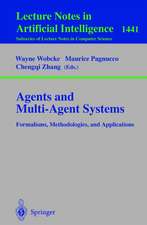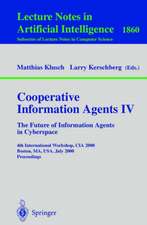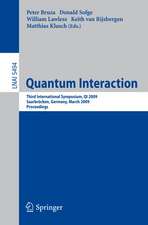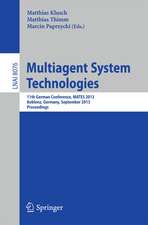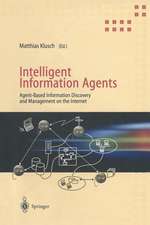Cooperative Information Agents XI: 11th International Workshop, CIA 2007, Delft, The Netherlands, September 19-21, 2007, Proceedings: Lecture Notes in Computer Science, cartea 4676
Editat de Matthias Klusch, Koen V. Hindriks, Mike P. Papazoglou, Leon Sterlingen Limba Engleză Paperback – 6 sep 2007
Din seria Lecture Notes in Computer Science
- 20%
 Preț: 1061.55 lei
Preț: 1061.55 lei - 20%
 Preț: 307.71 lei
Preț: 307.71 lei - 20%
 Preț: 438.69 lei
Preț: 438.69 lei - 20%
 Preț: 645.28 lei
Preț: 645.28 lei -
 Preț: 410.88 lei
Preț: 410.88 lei - 15%
 Preț: 580.46 lei
Preț: 580.46 lei - 17%
 Preț: 427.22 lei
Preț: 427.22 lei - 20%
 Preț: 596.46 lei
Preț: 596.46 lei -
 Preț: 381.21 lei
Preț: 381.21 lei - 20%
 Preț: 353.50 lei
Preț: 353.50 lei - 20%
 Preț: 1414.79 lei
Preț: 1414.79 lei - 20%
 Preț: 309.90 lei
Preț: 309.90 lei - 20%
 Preț: 583.40 lei
Preț: 583.40 lei - 20%
 Preț: 1075.26 lei
Preț: 1075.26 lei - 20%
 Preț: 310.26 lei
Preț: 310.26 lei - 20%
 Preț: 655.02 lei
Preț: 655.02 lei - 20%
 Preț: 580.93 lei
Preț: 580.93 lei - 20%
 Preț: 340.32 lei
Preț: 340.32 lei - 15%
 Preț: 438.59 lei
Preț: 438.59 lei - 20%
 Preț: 591.51 lei
Preț: 591.51 lei - 20%
 Preț: 649.49 lei
Preț: 649.49 lei - 20%
 Preț: 337.00 lei
Preț: 337.00 lei -
 Preț: 449.57 lei
Preț: 449.57 lei - 20%
 Preț: 607.39 lei
Preț: 607.39 lei - 20%
 Preț: 1024.44 lei
Preț: 1024.44 lei - 20%
 Preț: 579.30 lei
Preț: 579.30 lei - 20%
 Preț: 763.23 lei
Preț: 763.23 lei - 20%
 Preț: 453.32 lei
Preț: 453.32 lei - 20%
 Preț: 575.48 lei
Preț: 575.48 lei - 20%
 Preț: 585.88 lei
Preț: 585.88 lei - 20%
 Preț: 825.93 lei
Preț: 825.93 lei - 20%
 Preț: 763.23 lei
Preț: 763.23 lei - 17%
 Preț: 360.19 lei
Preț: 360.19 lei - 20%
 Preț: 1183.14 lei
Preț: 1183.14 lei - 20%
 Preț: 340.32 lei
Preț: 340.32 lei - 20%
 Preț: 504.57 lei
Preț: 504.57 lei - 20%
 Preț: 369.12 lei
Preț: 369.12 lei - 20%
 Preț: 583.40 lei
Preț: 583.40 lei - 20%
 Preț: 343.62 lei
Preț: 343.62 lei - 20%
 Preț: 350.21 lei
Preț: 350.21 lei - 20%
 Preț: 764.89 lei
Preț: 764.89 lei - 20%
 Preț: 583.40 lei
Preț: 583.40 lei -
 Preț: 389.48 lei
Preț: 389.48 lei - 20%
 Preț: 341.95 lei
Preț: 341.95 lei - 20%
 Preț: 238.01 lei
Preț: 238.01 lei - 20%
 Preț: 538.29 lei
Preț: 538.29 lei
Preț: 336.35 lei
Preț vechi: 420.43 lei
-20% Nou
Puncte Express: 505
Preț estimativ în valută:
64.37€ • 66.79$ • 53.80£
64.37€ • 66.79$ • 53.80£
Carte tipărită la comandă
Livrare economică 15-29 martie
Preluare comenzi: 021 569.72.76
Specificații
ISBN-13: 9783540751182
ISBN-10: 3540751181
Pagini: 378
Ilustrații: XI, 364 p. With online files/update.
Dimensiuni: 155 x 235 x 24 mm
Greutate: 0.53 kg
Ediția:2007
Editura: Springer Berlin, Heidelberg
Colecția Springer
Seriile Lecture Notes in Computer Science, Lecture Notes in Artificial Intelligence
Locul publicării:Berlin, Heidelberg, Germany
ISBN-10: 3540751181
Pagini: 378
Ilustrații: XI, 364 p. With online files/update.
Dimensiuni: 155 x 235 x 24 mm
Greutate: 0.53 kg
Ediția:2007
Editura: Springer Berlin, Heidelberg
Colecția Springer
Seriile Lecture Notes in Computer Science, Lecture Notes in Artificial Intelligence
Locul publicării:Berlin, Heidelberg, Germany
Public țintă
ResearchCuprins
Invited Contributions.- Managing Sensors and Information Sources Using Semantic Matchmaking and Argumentation.- Towards a Delegation Framework for Aerial Robotic Mission Scenarios.- Analysis of Negotiation Dynamics.- Multi-agent Learning Dynamics: A Survey.- Information Search and Processing.- An Architecture for Hybrid P2P Free-Text Search.- Multi-agent Cooperative Planning and Information Gathering.- Using Distributed Data Mining and Distributed Artificial Intelligence for Knowledge Integration.- Quantifying the Expected Utility of Information in Multi-agent Scheduling Tasks.- Applications.- Agent-Based Traffic Control Using Auctions.- High-Performance Agent System for Intrusion Detection in Backbone Networks.- A MultiAgent System for Physically Based Rendering Optimization.- Neural Network Based Multiagent System for Simulation of Investing Strategies.- Business Ecosystem Modelling: Combining Natural Ecosystems and Multi-Agent Systems.- From Local Search to Global Behavior: Ad Hoc Network Example.- Rational Cooperation.- A Generic Framework for Argumentation-Based Negotiation.- The Effect of Mediated Partnerships in Two-Sided Economic Search.- Who Works Together in Agent Coalition Formation?.- Interaction and Cooperation.- Using Ant’s Brood Sorting to Increase Fault Tolerance in Linda’s Tuple Distribution Mechanism.- Agent Behavior Alignment: A Mechanism to Overcome Problems in Agent Interactions During Runtime.- Methods for Coalition Formation in Adaptation-Based Social Networks.- Trust.- Trust Modeling with Context Representation and Generalized Identities.- Learning Initial Trust Among Interacting Agents.- A Probabilistic Framework for Decentralized Management of Trust and Quality.- Formal Analysis of Trust Dynamics in Human and Software Agent Experiments.


